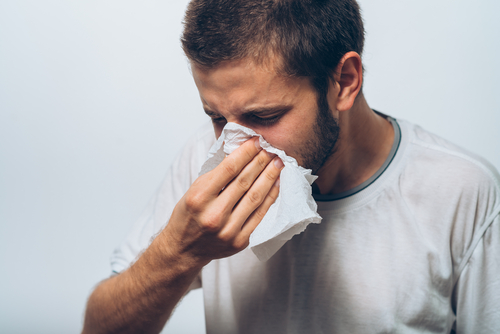Cocaine is a powerful stimulant that affects the central nervous system and is known for its intense effects, which include overwhelming euphoria, increased energy, hyperactivity, and talkativeness. Many users report feeling more alert and energetic, in addition to an increase in confidence and euphoria. While these effects occur immediately after taking a dose, they disappear fairly quickly, leaving the user with a cocaine hangover. Those who are locked in a cycle of cocaine use may need professional help to overcome their addiction.

What Is a Cocaine Hangover?
A cocaine hangover (also known as a comedown or crash) occurs when the effects of cocaine start to fade, leaving the user feeling irritable, tired, and sad. A cocaine comedown may also lead to anxiety, confusion, and excessive sweating. Unfortunately, these uncomfortable side effects can lead to increased drug use in an attempt to regain the positive effects. As use increases, so does tolerance. Cocaine can also lead to impulsive and sometimes violent behavior.
Can It Be Dangerous to Comedown From Cocaine?
While it is not typically physically dangerous to experience a cocaine hangover, the symptoms are challenging to deal with. Depending on how much a person uses, these negative symptoms can last up to several days. For most users, comedown symptoms, which can also be considered withdrawal symptoms, start within minutes or hours after the drug leaves the body. Coming down off of cocaine can pose a high risk of relapse, especially if the user is dealing with significant stress and depression due to prolonged use. In addition, some users may have thoughts of hurting themselves or others. For these reasons, medical detox is often recommended for heavy cocaine users who are attempting to quit.
Connect With Us Now
Reach out to us now for immediate support, or let us know the best time to contact you through our confidential callback service. Your journey to healing is just a conversation away.

What Are the Symptoms of a Cocaine Hangover?
The most common cocaine hangover symptoms include:
- Irritability: Some people experiencing a cocaine hangover may have a lower tolerance for stress and can become easily annoyed or angry with others.
- Runny nose: Cocaine is a vasoconstrictor that shrinks the blood vessels in the nose when snorted. As it wears off, these blood vessels become wider than before, which may lead to feelings of congestion, as well as cold and flu-like symptoms.
- Restlessness: Some people become very anxious, agitated, and unable to relax.
- Insomnia and sleep disturbances: Although extreme exhaustion is common, a person may not be able to fall asleep. When they do finally sleep, they may experience vivid, unsettling dreams.
- Cravings: Most users will experience intense cravings during comedown, which are difficult to ignore. This may contribute to further use and potential addiction.
- Physical exhaustion: Extreme tiredness and lethargy are some of the primary symptoms of a cocaine hangover. It is common to feel physically and mentally drained due to the substance leaving the body.
- Brain fog: Cognitive abilities are significantly impaired when experiencing a cocaine hangover. This leads to an inability to think clearly and make good decisions.
- Depression: Cocaine comedown often leads to feelings of sadness and hopelessness. It might even cause clinical depression.
- Shakiness: Tremors in the extremities, arms, and legs are a common physical symptom that is associated with cocaine withdrawal.
- Increase in appetite: Overeating is common during a cocaine comedown, and eating more calories than necessary may lead to weight gain.
- Aches and pains: Cocaine use causes neurotransmitter disruptions, leading to aches and pains when moving around.
While drug withdrawal symptoms may last for several hours or days, long-term cocaine abuse can lead to post-acute withdrawal syndrome, which can last multiple months.
Take Our Addiction Quiz For Recovery Insights
How Can You Come Down off Coke Safely?
Coming down from cocaine can be extremely challenging. The plethora of physical and mental symptoms causes some people to use it again to achieve some relief. If you are experiencing drug withdrawal while coming down from cocaine, make sure to drink plenty of water. Cocaine use can cause dehydration. Try to eat well-balanced meals to stabilize your blood sugar. Meals can also alleviate some symptoms like irritability and fatigue.
Rest is important when experiencing a cocaine comedown, and you should try to get enough sleep to aid in recovery. Light physical activity such as yoga, walking, and simple stretching exercises can also reduce restlessness and boost mood.
It’s also important to tend to your mental health. Medication and deep breathing techniques can calm a racing mind. You may find it helpful to reach out to family members or friends who will provide you with the emotional support you need during this difficult time.

Long-Term Harm and Risks Associated With Cocaine Use
Cocaine is a highly addictive drug that may have serious effects on your overall health. There are many long-term effects associated with cocaine use. Significant changes in brain chemistry are possible, and additional health issues may arise. Cocaine can exacerbate existing medical conditions, especially in those with cardiovascular disease. These health risks include:
- Hypertension and increased heart rate
- Irregular or rapid breathing
- Nausea
- Headaches
- Vertigo
- Muscle twitches
- Abdominal pain
- Chest pains and heart palpitations
- Vasospasm
- Reduced appetite
- Insomnia
- Hyperthermia (overheating)
- Overdose
- Respiratory collapse
Long-term cocaine use may also cause a hole in the septum. Many people struggle for years with cocaine addiction. Long-term harm associated with heavier doses and prolonged use can include an increased risk of strokes, kidney failure, pulmonary edema, and addiction. Cocaine use can also lead to psychological risks, such as depression, paranoia, and aggression.
What Is Cocaine Psychosis?
Cocaine is an unpredictable drug, and it affects everyone in different ways. Sometimes, cocaine causes cocaine psychosis. Research shows that 68% to 84% of individuals who use cocaine will eventually develop cocaine psychosis at some point. Cocaine psychosis can last for a few hours. However, some people will experience symptoms for several days. Symptoms of cocaine psychosis may include:
- Unusual thoughts or delusions
- Paranoia
- Feeling invincible
- Hallucinations or seeing or hearing things that are not there

Difference Between Crack & Cocaine
While both crack and cocaine are stimulants that come from the cocoa plant, there are some differences. Cocaine is typically known to be a white powder and is snorted through the nose, while crack is dissolved with baking soda and forms into a rock-like consistency. Before use, crack cocaine is heated back up and then smoked, while powder cocaine is usually snorted through the nose.
Crack and powder cocaine have different effects on the body. Crack tends to be more volatile and is less expensive than powder cocaine, although the cost can vary depending on quality and location of sale. Crack also tends to be more addictive because it is more concentrated. Because it is smoked instead of snorted, it reaches the bloodstream quicker, and the user feels a high more rapidly when compared to powder cocaine. Both cocaine and crack can lead to a cocaine hangover or comedown.
How Do You Know if It’s Time to Seek Treatment?
If you notice an increase in your drug use and find it difficult to stop, it may be time to seek help. It is possible to become addicted to cocaine, especially if a person regularly uses it for an extended period. Those who do become addicted can develop a tolerance for cocaine, and they may end up needing more of the drug to achieve the same effect. As a person becomes addicted, they may find that their drug use takes precedence over all other aspects of their life. They often crave the drug and find it difficult to stop using it.
Are You Covered For Cocaine Treatment?
Oasis Recovery Center partners with numerous private insurance providers. Our team is committed to assisting you in quickly and effortlessly verifying your insurance coverage for treatment.
What Treatments Are Available for Cocaine Addiction?
Cocaine addiction is a complex disease that impacts one’s mental, social, and physical well-being. For this reason, a combination of treatments may be used. Fortunately, there are many effective treatments for cocaine addiction. These treatments may include:
- Inpatient programs
- Partial hospitalization programs
- Medication-assisted treatment (MAT)
- Intensive outpatient programs
- Individual counseling
- Dual diagnosis treatment
- Prescription medication
- Cognitive behavioral and trauma-informed therapies
- Support groups and aftercare treatment
Addiction treatment centers provide a personalized approach to treatment that will comprehensively address your individual needs. If you use cocaine and need help with addiction, there is hope. By seeking treatment, you can achieve lasting recovery and develop healthier habits and coping mechanisms that do not involve drug use. By getting clean and receiving help, you can overcome the effects of cocaine addiction and achieve a better quality of life that doesn’t include substance abuse.
Cocaine Addiction Treatment In Cohasset, Massachusetts
If you or a loved one is abusing cocaine or experiencing cocaine hangovers, contact East Coast Recovery Center in Cohasset, Massachusetts. Just outside Boston, our substance abuse treatment center is perfect for individuals looking to disconnect from addiction and reconnect with themselves. Even if you’re not ready for treatment, talking to one of our admissions agents can point you in the right direction.











